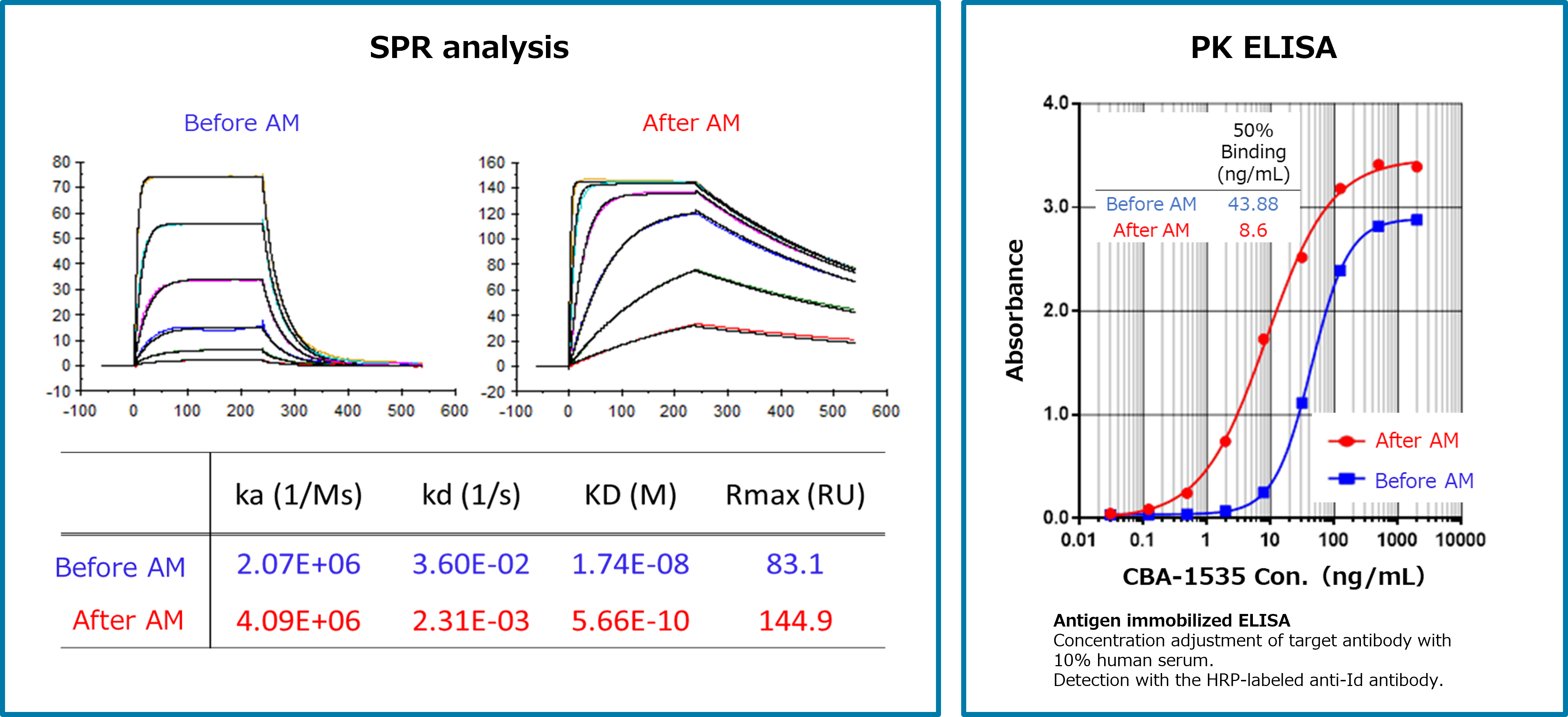Affinity
Maturation抗体親和性成熟
カイオムの抗体親和性成熟技術 Affinity Maturation : Chiome's Properietary Antibody Technology
ADLib®システムで取得した候補クローンはもちろん、他プラットフォーム(ハイブリドーマなど)で取得した抗体の親和性も向上させることができます。独自技術をさらに改良することで工数を削減し、従来よりも短時間・低価格を実現しました。 It can improve the affinity of candidate clones acquired with the ADLib® system as well as antibodies acquired with other platforms (e.g. hybridomas). Further improvements to the proprietary technology have reduced the number of processes, resulting in a shortened timeline and reduced costs, compared to provious.
その特長は? Advantages
◆ 細胞が持つ機能を利用した抗体遺伝子への変異導入 Mutagenesis of immunoglobulin genes using the intrinsic function of the cell.抗体発現株作製後、変異導入は数日で完了 Mutation induction to immunoglobulin genes is completed within a few days using engineered cells expressing desired-existing antibodies.
◆ 通常1ラウンドのセレクションで高親和化候補抗体を選抜(速い、簡単) Candidates with higher affinity are efficiently selected within a single round of selection.
◆ 1抗原につき数種類の抗体を同時に受け入れ可能 Multiple antibodies per one antigen can be accepted concurrently.
ケース1. 既存抗体の親和性成熟(KI-AMP) Case 1. Affinity Maturation for Existing Antibodies (KI-AMP)
ハイブリドーマなど他プラットフォームで既に取得されている抗体の配列情報をもとに、その抗体を発現するDT40細胞株を構築します。その後、DT40細胞内で抗体遺伝子に変異を導入し、高親和性を示す候補クローンを単離します。
DT40 cell lines expressing the desired antibody are constructed based on the sequence information of antibodies already obtained on other platforms, such as hybridomas. Subsequently, mutations are introduced into the immunoglobulin genes of the DT40 cells, and candidate clones showing higher affinity are isolated.
- 1. DT40の抗体遺伝子を既存抗体の遺伝情報と置換 (株づくり)。 Converting genetic information into desired-existing antibodies in a DT40 cell (strain construction).
- 2. 作製した株の抗体発現チェックおよび抗原への結合性チェック。 The antibody expression and their antigen binding of construceted strains are verified.
- 3. 細胞を一定期間、特定の条件下で培養し、抗体遺伝子に変異を導入(独自技術)。抗体遺伝子に様々な変異が入ったライブラリとなる。 Cells are cultured under specific conditions for a specified duration, and mutations are introduced into the immunoglobulin genes using proprietary technologies. A library containing various mutations in the antibody is produced.
- 4. 蛍光標識した抗原を用い、親和性が向上した細胞のみをソーティングする。 Only cells with improved affinity are sorted using fluorophore-labelled antigens.
- 5. 候補クローンについて、ELISA、配列解析、SPR解析などで、特性をさらに解析する。 Candidate clones are further characterised by ELISA, sequence analysis, SPR analysis, etc.


ケース2. ADLib®システム由来クローンの親和性成熟 Case 2. Affinity Maturation of ADLib® System-Derived Clones.
ADLib®システムにより選抜されたクローン(DT40細胞)の親和性成熟は非常にシンプルです。遺伝子操作を経ることなく、そのまま特定の条件下で培養するだけで元クローンの抗体遺伝子に様々な変異が入ったライブラリとなります。ライブラリ作製後は、ケース1. KI-AMPと同様の方法で高親和性候補クローンを単離します。
実施例: ADLibセレクションで選抜された抗Id抗体の親和性成熟
カイオムで臨床開発中の CBA-1535(ヒト化抗5T4・抗CD3二重特異性抗体)の測定系で用いる抗イディオタイプ抗体をADLib®ヒトライブラリより取得し、続けて親和性成熟を実施した。
KD値が改善され、PK ELISAアッセイでは感度が5倍程度上がった。
The process of affinity maturation for clones (DT40 cells) selected by the ADLib® system is very simple. Without any genetic manipulation, the library contains various mutation into the immunoglobulin genes of the original clone through controlled cell culture. After library preparation, higher-affinity candidate clones are isolated in the same way as in case 1. KI-AMP.
Case study: Affinity Maturation of Anti-Idiotypic Antibodies Selected by ADLib® Selection The anti-idiotypic antibodies intended for use in the CBA-1535 assay system (a humanized anti-5T4 and anti-CD3 bispecific antibody) under clinical development at Chiome were obtained from the ADLib® human library, and subsequently affinity maturation was performed.
This led to an improvement in KD values and a 5-fold increase in sensitivitly in the PK ELISA.


ADLib®システムの技術情報はこちら Click here on technical information on the ADLib® system
抗体作製サービスの詳細はこちら Click here on information on antibody generation services